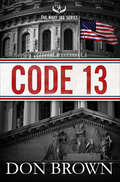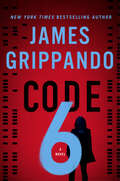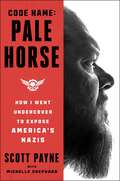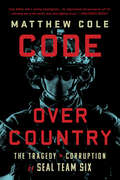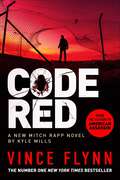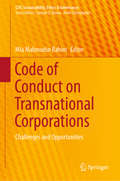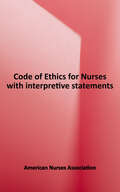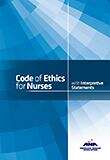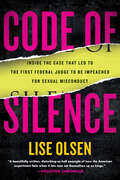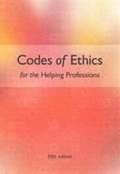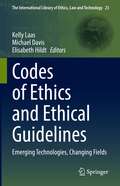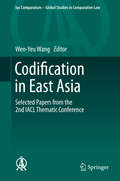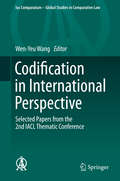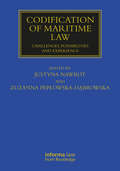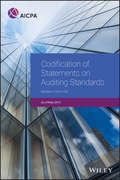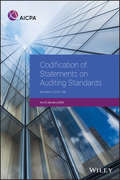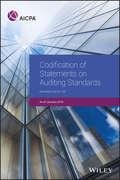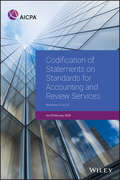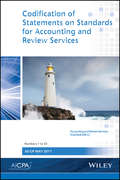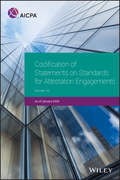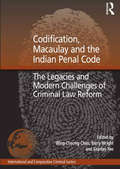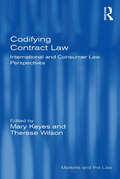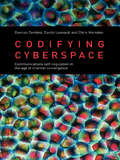- Table View
- List View
Code 13 (The Navy JAG Series #2)
by Don BrownTHE U.S. NAVY&’S BILLION-DOLLAR CONTRACT FOR THE SALE OF DRONES LANDS TWO NAVY JAG OFFICERS IN THE GUN SIGHTS OF A KILLER.Caroline is just getting her feet wet at the prestigious Code 13, but is thankful for at least one familiar face—her old flame, P.J. MacDonald. He loops her into the assignment he is currently working on—the legality of a proposed drone-sharing contract with Homeland Security that would allow the sale of drones for domestic surveillance. The contractor wants a legal opinion clearing the contract for congressional approval. But the mob wants the proposal dead-on-arrival.When P.J. is gunned down in cold blood and a second JAG officer is killed, one thing becomes clear: whoever is ordered to write the legal opinion on the drones becomes a target. Which is exactly why Caroline goes to her commanding officer and volunteers to write the legal opinion herself. She is determined to avenge P.J.&’s death and trap the killer, even if that means making herself a target.It is a deadly game of Russian roulette for the sake of justice, but Caroline is determined to see it through, even if it costs her life.
Code 6: A Novel
by James Grippando“A Pandora’s box of demons. . . . High-stakes espionage, family drama, double crosses, noble gestures . . . it’s all here.” — Kirkus Reviews“An ambitious thriller that. . . delivers a deeply satisfying conclusion. . . . Code 6 features some of Grippando's most compelling characters and one of his most intriguing stories.” — BooklistHarper Lee Prize winner and New York Times bestselling author James Grippando returns with a bold new thriller that asks at what price do we open our lives to Big Data.Aspiring playwright, Kate Gamble, is struggling to launch a script she’s been secretly researching her entire life, mostly at the family dinner table. Her father is Christian Gamble, CEO of Buck Technologies, a private data integration company whose clients include the CIA and virtually every counter-terrorism organization in the Western World. Kate’s father adores her, and a play about the dark side of Big Data would be the ultimate betrayal in his eyes. But Kate is compelled to tell this story—not only as an artist exploring the personal information catastrophe that affects us all, but as a daughter trying to understand her mother’s apparent loss of purpose, made even more disturbing by the suicide note she left behind: I did it for Kate.Then Patrick Battle comes back into her life, changing everything she has ever thought about her play, her father, and her mother’s tragic death. Patrick is a childhood friend, but he is now Buck’s golden boy with security clearance to the company’s most sensitive projects. When Buck comes under investigation by the Justice Department and Patrick suddenly goes missing, Kate doesn’t know who to trust. A phone call confirms her worst nightmare: Patrick has been kidnapped, and the ransom demand is “Code 6”—the most secret and potentially dangerous technology her father’s company has ever developed.Kate’s fight to bring Patrick home safely reveals a conspiracy and cover up that may implicate one of the most powerful executives in the tech industry, while the development of Kate’s play unleashes family secrets and the demons behind her mother’s cryptic final note. The two paths converge in explosive fashion, leading to a shocking and terrifying discovery that puts Kate and Patrick in the crosshairs of forces who will stop at nothing to control Code 6.
Code Name: How I Went Undercover to Expose America's Nazis
by Scott PayneThe thrilling true story of one man who risked his life to infiltrate the most dangerous neo-Nazi group in the United States, an &“urgent and exciting look into the life of an FBI undercover agent&” (Joe Pistone) by &“one of the top undercover agents in the Bureau&” (Joaquin &“Jack&” Garcia).When Scott Payne was growing up, an &‘80s kid with a big attitude and a taste for sleeveless shirts, he could never have envisioned where he&’d find himself on Halloween night 2019. Having transformed into &“Pale Horse&” and infiltrated the nation's most dangerous, fastest-growing white supremacy group, The Base, he was huddled with a cell of neo-Nazis in the backwoods of Georgia as they slaughtered a goat and drank its blood in a ritual sacrifice. A decorated agent dubbed the &“Hillbilly Donnie Brasco,&” Payne takes readers along with him on some of the most terrifying and riskiest assignments in FBI history. He went deep undercover with the lethal Outlaw Motorcycle Club in Massachusetts; to the front lines of the opioid epidemic in Tennessee; and infiltrated the Ku Klux Klan in Alabama. Through it all, he stayed married to the love of his life, raised two girls, and spent his Sundays at church, sustained by family and faith. Timely and unputdownable, Code Name: Pale Horse is a hard look a some of the most pressing threats facing America today. Honest and inspiring, it&’s the story of a hero determined to take down a hateful army—before the unthinkable could come to pass.
Code Over Country: The Tragedy and Corruption of SEAL Team Six
by Matthew ColeA hard-hitting exposé of SEAL Team 6, the US military&’s best-known brand, that reveals how the Navy SEALs were formed, then sacrificed, in service of American empire.The Navy SEALs are, in the eyes of many Americans, the ultimate heroes. When they killed Osama Bin Laden in 2011, it was celebrated as a massive victory. Former SEALs rake in cash as leadership consultants for corporations, and young military-bound men dream of serving in their ranks.But the SEALs have lost their bearings. Investigative journalist Matthew Cole tells the story of the most lauded unit, SEAL Team 6, revealing a troubling pattern of war crimes and the deep moral rot beneath authorized narratives. From their origins in World War II, the SEALs have trained to be specialized killers with short missions. As the wars in Iraq and Afghanistan became the endless War on Terror, their violence spiraled out of control.Code Over Country details the high-level decisions that unleashed the SEALs&’ carnage and the coverups that prevented their crimes from coming to light. It is a necessary and rigorous investigation of the unchecked power of the military—and the harms enacted by and upon soldiers in America&’s name.
Code Red: The pulse-pounding thriller from the author of American Assassin (A\mitch Rapp Novel Ser. #22)
by Kyle Mills Vince FlynnA simple favour. A debt to be paid. A threat no one saw coming. Mitch Rapp owes powerful criminal Damian Losa a favour, and it&’s being called in. With no choice other than to honour his agreement, Rapp heads to Syria to stop a new designer drug spreading into Losa&’s territory. When he discovers the true culprit – someone with far bigger goals than just Syria – the scale of his mission grows. But Rapp and his team are operating in an incredibly volatile country where the US has few assets and allegiances shift almost daily. And just one false move would set off an international confrontation that could easily spin out of control and rewrite the world order . . . Praise for the Mitch Rapp series &‘Grabs you by the scruff of the neck on page one and doesn&’t let you go until the end&’ Stephen Leather &‘Sizzles with inside information and CIA secrets&’ Dan Brown &‘A cracking, uncompromising yarn that literally takes no prisoners&’ The Times &‘Vince Flynn clearly has one eye on Lee Child's action thriller throne with this twist-laden story . . . instantly gripping&’ Shortlist &‘Action-packed, in-your-face, adrenalin-pumped super-hero macho escapist fiction that does exactly what it says on the label&’ Irish Independent &‘Mitch Rapp is a great character who always leaves the bad guys either very sorry for themselves or very dead&’ Guardian
Code of Conduct on Transnational Corporations: Challenges and Opportunities (CSR, Sustainability, Ethics & Governance)
by Mia Mahmudur RahimThis book explores the challenges and opportunities presented by the formulation of a global code of conduct for transnational corporations. It assesses the current state of research on global regulations intended to enhance the social responsibility of transnational corporations, and provides a platform for future research. In particular the book examines frameworks and instruments for regulating social responsibility, reviews recent developments concerning the proposed UN Code of Conduct on Transnational Corporations, and provides insights into international civil society groups’ movements in pursuit of a code of conduct. In a separate chapter the book discusses theoretical issues in regulating transnational corporations, and investigates their legitimacy and behavioral dynamics. In closing, the book discusses alternatives to a global code of conduct, the impact of sovereign power in the era of globalization, “soft regulations,” and the feasibility and normative efficacy of enforcing regulations.
Code of Conduct on Transnational Corporations: Challenges and Opportunities (CSR, Sustainability, Ethics & Governance)
by Mia Mahmudur RahimThis book explores the challenges and opportunities presented by the formulation of a global code of conduct for transnational corporations. It assesses the current state of research on global regulations intended to enhance the social responsibility of transnational corporations, and provides a platform for future research. In particular the book examines frameworks and instruments for regulating social responsibility, reviews recent developments concerning the proposed UN Code of Conduct on Transnational Corporations, and provides insights into international civil society groups’ movements in pursuit of a code of conduct. In a separate chapter the book discusses theoretical issues in regulating transnational corporations, and investigates their legitimacy and behavioral dynamics. In closing, the book discusses alternatives to a global code of conduct, the impact of sovereign power in the era of globalization, “soft regulations,” and the feasibility and normative efficacy of enforcing regulations.
Code of Criminal Procedure (Tamil Language): குற்றவியல் நடைமுறை சட்டம் 1973 இளவர் நீதி குழந்தைகள் கவனிப்பு மற்றும் பாதுகாப்பு சட்டம் 2000 குற்றவாளிகள் நன்னடத்தைச் சட்டம் 1958
by P. Jaganathan Usha Jaganathanஇந்த ஆவணம் குற்றவியல் நடைமுறைச் சட்டம், 1973 மற்றும் 2008 மற்றும் 2013 திருத்தங்களின் முக்கிய அம்சங்களைத் தொகுத்து விளக்குகிறது. இளவர் நீதி (2000) மற்றும் குற்றவாளிகள் நன்னடத்தைச் சட்டம் (1958) போன்ற சட்டங்கள் அடங்கிய இந்நூல், சட்ட வரையறைகள், குற்றவியல் நடைமுறைகள் மற்றும் நீதிமன்ற நடவடிக்கைகளை விரிவாக ஆராய்கிறது. சட்ட மாணவர்களுக்கும் வழக்கறிஞர்களுக்கும் பயன்படும் வகையில், சட்ட விதிகள் எளிமையாக விளக்கப்பட்டு பல்கலைக்கழக வினாக்களுக்கான விடைகளும், முன்னோடியான வழக்குகளும் தரப்பட்டுள்ளன. நீதிமன்ற நடவடிக்கைகளின் முன்னோட்டம், காவல் துறையின் அதிகாரங்கள், முன் ஜாமீன், விசாரணை நடைமுறைகள், மற்றும் பாதிக்கப்பட்டவர்களின் உரிமைகள் குறித்து விரிவாக குறிப்பிடப்பட்டுள்ளது. குற்றவியல் சட்டத்தின் அடிப்படைகளையும் நடைமுறைகளையும் புரிந்து கொள்ள உதவும் மிகச் சிறந்த வழிகாட்டியாக இந்த நூல் செயல்படுகிறது.
Code of Ethics for Nurses
by American Nurses AssociationThe 2025 Code of Ethics for Nurses reaffirms and expands the ethical foundation of the nursing profession, now with ten provisions that illuminate the essential relationships central to nursing practice. Grounded in nursing’s enduring commitment to health and social justice, the Code serves as a timeless yet dynamic foundation to nursing theory, practice, and praxis, expressing the values, virtues, ideals, and obligations that shape and guide the profession. This revised 2025 edition retains the nine provisions from the 2015 Code, with updates to reflect the evolving needs of nursing practice. A new tenth provision has been added, focusing on global ethical issues, emphasizing nursing's commitment to health and well-being on a global scale complementing the relational structure already established: Nurse to Patient (Provisions 1–3) Nurse to Nurse (Provisions 4 and 6) Nurse to Self (Provision 5) Nurse to Profession (Provision 7) Nurse to Others (Provision 8) Nursing to Society and the Global Community (Provisions 9 and 10) These relationships are inherently reciprocal, reflecting nursing's commitment to the welfare of individuals, families, communities, and the global environment. Each provision is supported by interpretive statements that provide actionable guidance, contextualize ethical challenges, and reflect the profession’s relational ethos. Together, the Code’s provisions embody the core values, virtues, and ideals of nursing, offering a unifying moral framework for practice in all settings, adaptable to the evolving complexities of modern healthcare. The 2025 Code of Ethics for Nurses continues to uphold the profession’s commitment to ethical excellence, guiding nurses in their dedication to health, humanity, and the environment. This indispensable resource empowers nurses to navigate the moral complexities of their roles while advancing nursing’s transformative impact on individuals, communities, and the world.
Code of Ethics for Nurses with Interpretive Statement
by American Nurses Association StaffA book prepared by the American Nurses Association Staff to aid the registered nurses to foster high standard of nursing practice.
Code of Silence: Sexual Misconduct by Federal Judges, the Secret System That Protects Them, and the Women Who Blew the Whistle
by Lise OlsenIn the age of #MeToo, learn how brave whistleblowers have dared to lift the federal court&’s veil of secrecy to expose powerful judges who appear to defy laws they have sworn to uphold. Code of Silence tells the story of federal court employee Cathy McBroom, who had to flee her job as a case manager in Galveston, Texas, after enduring years of sexual harassment and assault by her boss—US District Judge Samuel Kent. Following a decade of firsthand reporting at the Houston Chronicle, investigative reporter Lise Olsen charts McBroom&’s assault and the aftermath, when McBroom was thrust into the role of whistleblower to denounce a federal judge.What Olsen discovered by investigating McBroom&’s story and other federal judicial misconduct matters nationwide was shocking. With the help of other federal judges, Kent was being protected by a secretive court system that has long tolerated or ignored complaints about corruption, sexism, and sexual misconduct—enabling him to remain in office for years. Other powerful judges accused of judicial misconduct were never investigated and remain in power or retired with full pay, such as US Circuit Judge Alex Kozinski and Kozinski&’s mentee, Brett Kavanaugh.McBroom&’s ultimate triumph is a rare story of redemption and victory as Judge Kent became the first and only federal judge to be impeached for sexual misconduct. Olsen also weaves in narratives of other brave women across the country who, at great personal risk, have reported federal judges to reveal how sexual harassment and assault occur elsewhere inside the federal court system. The accounts of the women and their allies who are still fighting for reforms are moving, intimate, and inspiring—including whistleblowers and law professors like Leah Litman, Emily Murphy, and novelist Heidi Bond, who emerged to denounce Kozinski in 2017. A larger group of women—and men—banded together to form a group called Law Clerks for Accountability, which is continuing to push for more reforms to the courts&’ secretive complaint review system.Code of Silence also reveals the role the press plays in holding systems of power in check. Kent would not have been charged had it not been for Olsen&’s reporting and the Houston Chronicle&’s commitment to the story.
Codes Of Ethics For The Helping Professions
by Gerald Corey Marianne Schneider CoreyThis brief supplement offers students a handy resource that contains codes of ethics for the various professional organizations.
Codes of Ethics and Ethical Guidelines: Emerging Technologies, Changing Fields (The International Library of Ethics, Law and Technology #23)
by Michael Davis Elisabeth Hildt Kelly LaasThis book investigates how ethics generally precedes legal regulation, and looks at how changes in codes of ethics represent an unparalleled window into the research, innovation, and emerging technologies they seek to regulate. It provides case studies from the fields of engineering, science, medicine and social science showing how professional codes of ethics often predate regulation and help shape the ethical use of emerging technologies and professional practice. Changes in professional ethics are the crystallization of ongoing conversation in scientific and professional fields about how justice, privacy, safety and human rights should be realized in practice where the law is currently silent. This book is a significant addition to this area of practical and professional ethics and is of particular interest to practitioners, scholars, and students interested in the areas of practical and applied ethics.
Codification in East Asia: Selected Papers from the 2nd IACL Thematic Conference (Ius Comparatum - Global Studies in Comparative Law #2)
by Wen-Yeu WangThis book looks at codification from a broad, international perspective, discussing general themes as well as various legal fields. Since codification is a subject of intense current interest in East Asia, this second volume on codification is dedicated to the sub-theme of codification and legal transplant in this area, focusing on China, Japan, Korea and Taiwan. It includes two papers that discuss development of codification in East Asia and Korea in particular. It is also comprised of two reports that draw comparative lessons from Japan, India and Indonesia. In addition, this volume consists of four general reports and 19 national reports that guide readers through the knowledge of codification of commercial law, administrative law, civil law and private international law in East Asia. This book is developed from papers presented at the 2012 Thematic Conference of the International Academy of Comparative Law.
Codification in International Perspective: Selected Papers from the 2nd IACL Thematic Conference (Ius Comparatum - Global Studies in Comparative Law #1)
by Wen-Yeu WangNo aspect of legal formalism has interested comparative jurists as much as the extent of legislative codification across legal systems. This book looks at codification from a broad, international perspective, discussing general themes as well as various legal fields. The first of two volumes on this subject begins with a general theoretical and historical view of codification, followed by a series of other horizontal inquiries. It encompasses papers focusing on several significant contemporary issues in codification, including "codification of private law in post-soviet times", "criminal law codification beyond the nation state" and "soft codification of private law". In addition, this volume consists of general reports and national reports on administrative procedure and human rights, providing a comparative analysis of codification of law. This book is developed from papers presented at the 2012 Thematic Congress of the International Academy of Comparative Law.
Codification of Maritime Law: Challenges, Possibilities and Experience (Maritime and Transport Law Library)
by Justyna Nawrot Zuzanna Pepłowska-DąbrowskaThis book is the first of its kind to explore the problems inherent in the unification of maritime law. Featuring contributions from leading experts at European maritime law research centres, it considers international conventions, current maritime practice, standard forms and recently adopted or drafted national codifications of maritime law from the codification point of view. The book is divided into four parts which represent different views on the main topic. Part I gathers chapters dedicated to different aspects and methods of unification of maritime law on a global scale, as well as several specific issues of maritime law from the regulatory point of view. Part II of the book consists of those papers that centre around the issue of transport of goods. Part III is dedicated to codifications of carriage of passengers, cruise law and leisure navigation. Finally, Part IV addresses national codifications of maritime law. Codification of Maritime Law: Challenges, Possibilities and Experience seeks to provide common ground for future unification of maritime law, which makes the book useful both for private and public maritime lawyers and states’ maritime administrations worldwide.
Codification of Statements on Auditing Standards 2019: Numbers 122 to 135 (AICPA)
by AicpaThis 2019 edition delivers the current Statements on Auditing Standards (SASs) and related interpretations in a codified format, giving accountants the most up-to-date information, they need to conduct successful audits and provide high-quality services to their clients. <p><p> Issued directly from the AICPA, this authoritative guidance is essential to fully understand the requirements associated with an audit. <p> This codification is fully indexed and arranged by subject. The codified standards and related interpretations are vital to practitioners performing audits.
Codification of Statements on Auditing Standards, Numbers 122 to 138: 2020 (AICPA)
by AICPAThis 2020 edition delivers the current Statements on Auditing Standards (SASs) and related interpretations in a codified format, giving up-to-date information needed to conduct successful audits and provide high-quality services to clients. Issued directly by the AICPA, this authoritative guidance is essential to fully understand the requirements associated with an audit. This edition includes the following new standards: SAS No. 136, Forming an Opinion and Reporting on Financial Statements of Employee Benefit Plans Subject to ERISA SAS No. 137, The Auditor’s Responsibilities Relating to Other Information Included in Annual Reports SAS No. 138, Amendments to the Description of the Concept of Materiality
Codification of Statements on Auditing Standards: Numbers 122 to 133, January 2018
by AicpaThis edition delivers the current Statements on Auditing Standards (SASs) and related interpretations in a codified format, giving auditors the most up-to-date information they need to conduct successful audits and provide high-quality services to their clients. This authoritative guidance, issued directly from the AICPA, is essential to fully understand the requirements associated with an audit. This edition includes the following new standard: SAS No. 133, Auditor Involvement With Exempt Offering Documents This codification is fully indexed and arranged by subject. The codified standards and related interpretations are vital to practitioners performing audits.
Codification of Statements on Standards for Accounting and Review Services, Numbers 21 - 25: Numbers 21 - 24 (AICPA)
by AICPAThis book provides the requirements for performing engagements in accordance with Statements on Standards for Accounting and Review Services (SSARS). This updated edition includes the authoritative standards and interpretations applicable to preparation, compilation, and review engagements. The guidance and related interpretations will help you apply the standards in specific circumstances. The codification also clearly shows amendments, deleted or superseded content, and conforming changes due to the issuance of other authoritative guidance. The codification contains all SSARSs, including SSARS No. 21, which is now effective, through SSARS No. 25, Materiality in a Review of Financial Statements and Adverse Conclusions. SSARS No. 25 further converges AR-C section 90 with International Standard on Review Engagements (ISRE) 2400 (Revised), Engagements to Review Historical Financial Statements, and minimizes differences with the auditing standards regarding concepts that are consistent regardless of the level of service performed on the financial statements.
Codification of Statements on Standards for Accounting and Review Services: Numbers 1-23
by AicpaIn addition to SSARS No. 21, which is now effective, this edition includes two newly released Statements on Standards for Accounting and Review Services (SSARS): SSARS No. 22, Compilation of Pro Forma Financial Information, and SSARS No. 23, Omnibus Statement on Standards for Accounting and Review Services—2016. The codification statements are fully indexed and arranged by subject. The guidance (and related interpretations to the extent applicable) help apply the standards in specific circumstances and clearly show amendments, deleted or superseded portions, and conforming changes due to the issuance of other authoritative guidance.
Codification of Statements on Standards for Attestation Engagements: 2020 (AICPA)
by AICPAThis 2020 edition delivers the current clarified Statements on Standards for Attestation Engagements (SSAEs) and related interpretations in a codified format, providing the most up-to-date information needed to perform attestation engagements. This authoritative guidance, issued directly by the AICPA, is essential to fully understanding the requirements associated with an attestation engagement. This edition includes the following new standards: SSAE No. 19, Agreed-Upon Procedures Engagements SSAE No. 20, Amendments to the Description of the Concept of Materiality
Codification, Macaulay and the Indian Penal Code: The Legacies and Modern Challenges of Criminal Law Reform (International and Comparative Criminal Justice)
by Barry WrightEnacted in 1860, the Indian Penal Code is the longest serving and one of the most influential criminal codes in the common law world. This book commemorates its one hundred and fiftieth anniversary and honours the law reform legacy of Thomas Macaulay, the principal drafter of the Code. The book comprises chapters which examine the general principles of criminal responsibility from the perspective of Macaulay, and from more recent accounts by lawmakers and reformers. These are framed by chapters that examine the history and conceptual underpinnings of Macaulay's Code, consider the need to revitalize the Indian Penal Code, and review the current challenges of principled criminal law reform and codification. This book is a valuable reference on the Indian Penal Code, and current debates about general principles of criminal law for legal academics, judges, legal practitioners and criminal law reformers. It also promises to have wider scholarly appeal, of interest to legal theorists, historians and policy specialists.
Codifying Contract Law: International and Consumer Law Perspectives (Markets and the Law)
by Mary Keyes Therese WilsonExploring the advantages and disadvantages of codifying contract law, this book considers the question from the perspectives of both civil and common law systems, referring in detail to issues of international and consumer law. With contributions from leading international scholars, the chapters present a range of opinions on the virtues of codification, encouraging further debate on this topic. The book commences with a discussion on the internationalization imperative for codification of contract law. It then turns to regional issues, exploring first codification attempts in the European Union and Japan, and then issues relevant to codification in the common law jurisdictions of Australia, New Zealand and the United States. The collection concludes with two chapters which consider the need to draw upon both private and comparative international law perspectives to inform any codification reforms. This book will be of interest to international and comparative contract law academics, as well as regulators and policy-makers.
Codifying Cyberspace: Communications Self-Regulation in the Age of Internet Convergence
by Damian Tambini Danilo Leonardi Chris MarsdenCan the Internet regulate itself? Faced with a range of 'harms' and conflicts associated with the new media – from gambling to pornography – many governments have resisted the temptation to regulate, opting instead to encourage media providers to develop codes of conduct and technical measures to regulate themselves. Codifying Cyberspace looks at media self-regulation in practice, in a variety of countries. It also examines the problems of balancing private censorship against fundamental rights to freedom of expression and privacy for media users. This book is the first full-scale study of self-regulation and codes of conduct in these fast-moving new media sectors and is the result of a three-year Oxford University study funded by the European Commission.
